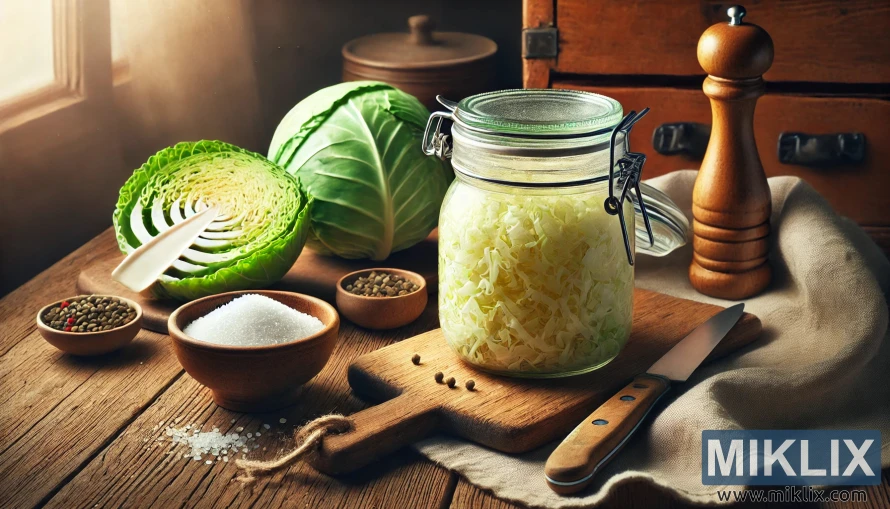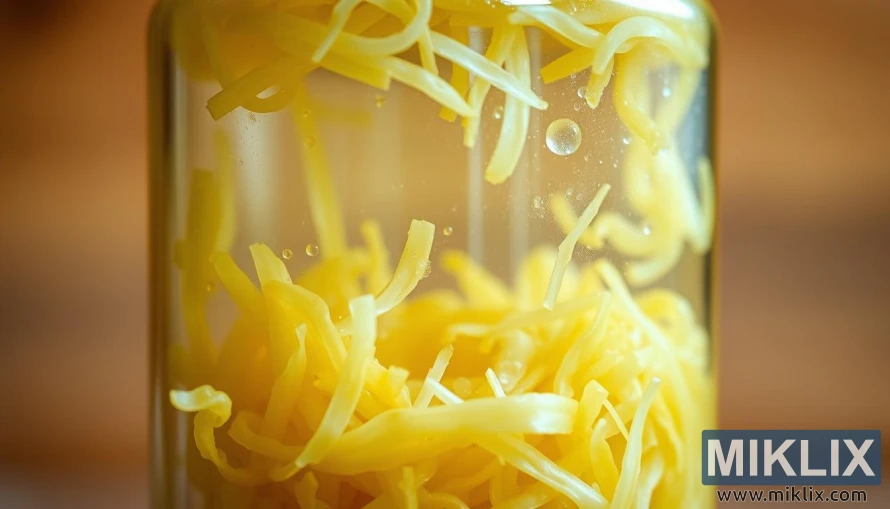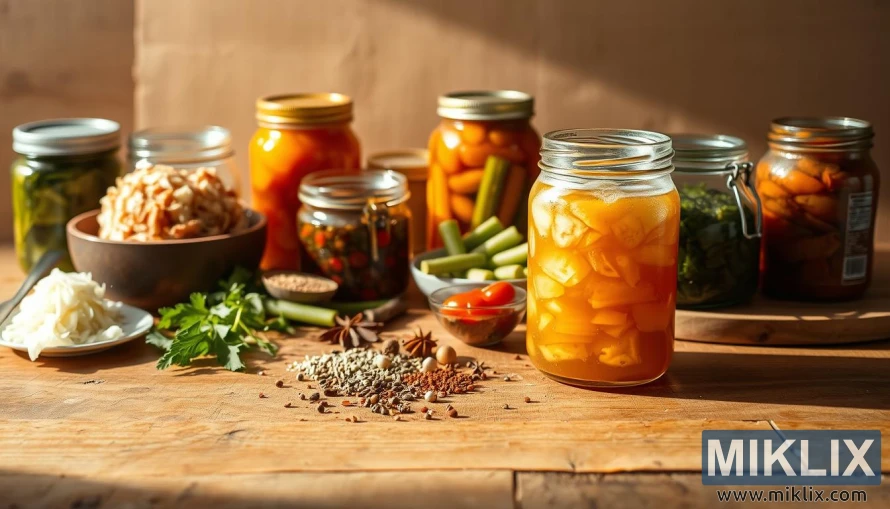Gut Feeling: Why Sauerkraut Is a Superfood for Your Digestive Health
Published: March 28, 2025 at 11:30:00 PM UTC
Sauerkraut, a traditional fermented cabbage, has been around for over 2,000 years. It started in Germany and turned cabbage into a probiotics-rich natural food. Now, science backs its benefits for gut health, reducing inflammation, and more. Its probiotics and nutrients match ancient wisdom with today's wellness. This natural food brings together tradition and science-backed benefits.
A 2021 review found that fermented foods like sauerkraut increase gut bacteria diversity. Its probiotics and nutrients match ancient wisdom with today's wellness. This natural food brings together tradition and science-backed benefits.
Key Takeaways
- Sauerkraut is a fermented cabbage with over 2,000 years of use.
- Its probiotics improve gut health and microbial diversity.
- Studies link it to lower inflammation and possible cancer risk reduction.
- Low-calorie and nutrient-rich, with vitamins like vitamin C and fiber.
- Backed by tradition and science as a natural food for wellness.
What Is Sauerkraut and How Is It Made?
Sauerkraut is a tangy fermented food made from shredded cabbage. 2,000 years ago, it was a way to keep vegetables fresh and safe to eat before refrigerators existed.
To make sauerkraut, you start by shredding cabbage and mixing it with salt. Lactic acid bacteria on the cabbage leaves eat the sugars, making lactic acid. This acid helps preserve the cabbage and grows good bacteria. Homemade sauerkraut keeps these live bacteria, unlike store-bought versions.
- Shred cabbage thinly to release its natural juices.
- Mix with salt to draw out moisture, creating brine.
- Pack into a clean jar, pressing until the cabbage is submerged under liquid to prevent mold.
- Cover with a cabbage leaf or lid, and let ferment at room temperature for 1-4 weeks.
- Once ready, refrigerate to slow fermentation and extend shelf life.
Traditional fermentation uses natural bacteria, while modern methods use controlled environments. Homemade sauerkraut lasts months when stored properly. It's not just preserved cabbage but a food full of probiotics and nutrients, thanks to fermentation.
The Nutritional Profile of Sauerkraut
Sauerkraut is known as a low calorie food with great nutritional benefits. A single cup (142g) has only 27 calories but packs essential vitamins and minerals. Here’s why it's special:
- Vitamin C: 17.9mg (20% DV) boosts immunity and helps repair tissues.
- Vitamin K: 19.6mcg (16% DV) strengthens bones and aids blood clotting.
- Fiber: 4 grams per cup, aiding in healthy digestion.
- Iron, manganese, and potassium enhance energy and metabolic function.
Fermentation makes nutrients like iron and zinc easier to absorb than in raw cabbage. Choose raw or homemade sauerkraut to keep more vitamin C and probiotics. Canned sauerkraut may lose some nutrients during processing.
Its vitamin K content is great for heart health and calcium balance. This tangy superfood shows you can get lots of nutrition without eating a lot of calories.
Probiotics: The Living Goodness in Sauerkraut
Sauerkraut is more than a tangy side dish. It's a powerhouse of living probiotic strains. These beneficial bacteria, like Lactobacillus, help keep your gut healthy. They balance the microbiome in your digestive tract.
Unlike many supplements, sauerkraut naturally has up to 28 distinct probiotic strains. This creates a diverse army of microbes. They work together to support your health.
Key beneficial bacteria in sauerkraut include Lactobacillus plantarum and Lactobacillus brevis. These strains help break down food and produce vitamins. They also crowd out harmful pathogens and strengthen your immune system.
- Supports gut health by boosting beneficial bacteria
- Improves nutrient absorption through natural enzymes
- May reduce bloating and support regular digestion
Naturally fermented sauerkraut delivers probiotics in a unique way. The food matrix protects bacteria during digestion. This ensures more reach your gut alive.
Commercial probiotics often have just one or two strains. But sauerkraut's variety offers broader benefits. Its fiber also acts as a prebiotic, feeding existing gut flora to thrive.
Choose unpasteurized options to preserve live cultures. A daily ¼ cup serving can contribute to a healthier gut ecosystem. This paves the way for better overall wellness.
Digestive Health Benefits of Regular Sauerkraut Consumption
Your gut is home to over 38 trillion microorganisms that help with digestion. Sauerkraut's probiotics support this ecosystem, protecting against toxins and harmful bacteria. Unpasteurized sauerkraut has live strains that strengthen your gut barrier, reducing the risk of intestinal inflammation and leaky gut syndrome.
A single serving of sauerkraut gives you 2 grams of fiber. This fiber acts as a prebiotic, feeding good bacteria. It also helps with constipation and keeps bowel movements regular. Research shows probiotics might help with IBS symptoms like bloating and irregularity, but more studies are needed. Sauerkraut's enzymes also help break down food, making digestion easier.
- IBS relief: Probiotic strains like Lactobacillus may reduce inflammation linked to IBS symptoms.
- Anti-inflammatory effects: Fermentation creates organic acids that calm intestinal inflammation.
- Natural detox: Gut flora boosted by sauerkraut help eliminate toxins, easing digestive stress.
Immune System Support from Fermented Foods
Your gut is home to up to 70% of your immune cells. Sauerkraut’s probiotics help keep your gut healthy. This strengthens your immune system. The good bacteria in sauerkraut train your immune cells to fight off threats.
Antioxidants like vitamin C in sauerkraut protect your immune cells from harm. Fermentation also makes minerals like iron and zinc easier to absorb. These nutrients help keep your immune system strong.
- Anti-inflammatory compounds in sauerkraut reduce chronic inflammation, a known trigger for weakened immunity.
- Studies show fermented foods may lower inflammatory markers like cytokines, which disrupt immune balance.
- Historic use by sailors to prevent scurvy highlights its role in cold prevention through vitamin C and probiotic support.
Recent studies suggest eating sauerkraut regularly can lower your risk of getting sick. Its anti-inflammatory effects are similar to those of other anti-inflammatory foods. This makes fermented cabbage a natural way to boost your defenses against infections.
Sauerkraut for Heart Health and Cholesterol Management
Sauerkraut is good for your heart. It has fiber and probiotics. Each cup has 4 grams of fiber, which helps remove cholesterol. This can lower your cholesterol levels.
The probiotics in sauerkraut may also help lower blood pressure. They work by affecting enzymes in blood vessels.
Vitamin K2 in sauerkraut is important too. It's found in 19 micrograms per cup. Vitamin K2 helps keep calcium out of arteries, which can prevent heart disease.
A Stanford study showed eating fermented foods like sauerkraut is beneficial. Participants saw:
- 10% lower LDL (bad cholesterol)
- Higher HDL (good cholesterol)
- Reduced systolic blood pressure by 8 points
But, sauerkraut has 939 mg of sodium per cup. This might be a concern for blood pressure management. Eating it in moderation is key. This way, you can enjoy its benefits without too much sodium.
Sauerkraut also has vitamin C and fiber, which fight inflammation. This is good for your heart. Adding sauerkraut to your meals can help keep your blood pressure in check. It's a tasty way to prevent heart disease without losing out on nutrition.
Weight Management and Metabolic Benefits
Sauerkraut is great for those trying to lose weight because it's low in calories and high in fiber. Each cup has only 27 calories but packs over 4 grams of fiber, which is 13% of what you need daily. This helps you feel full longer and keeps your blood sugar balanced.
Studies show that eating foods high in fiber, like sauerkraut, can help you lose weight without strict diets. It's a smart choice for anyone looking to manage their weight.
The probiotics in sauerkraut might also boost your metabolism. These good bacteria affect how your body absorbs nutrients and stores fat. Animal studies suggest probiotics can reduce fat absorption and improve metabolic health.
While human studies are ongoing, early results are promising. They indicate that these beneficial bacteria can help keep your gut healthy, which is important for weight management.
Fiber in sauerkraut also helps control blood sugar levels. It prevents sudden spikes and drops that can lead to overeating. A 2015 study found that eating 30g of fiber daily can help with weight loss, even without other diet changes.
Sauerkraut's tangy taste and crunchy texture can also curb cravings. Adding it to salads, sandwiches, or as a side can enhance your meals. Just remember to choose low-sodium brands to avoid too much salt.
Mixing sauerkraut with whole grains or protein can make your meals more satisfying. It's not a magic solution, but it's a valuable addition to any weight-conscious diet.
Anti-Inflammatory Properties of Sauerkraut
Sauerkraut has special nutrients and a fermentation process that fight inflammation. Cabbage's antioxidants get stronger during fermentation. This makes compounds that fight chronic inflammation.
These compounds unlock glucosinolates, turning into isothiocyanates. These are strong fighters against inflammation and free radicals.
Indole-3-carbinol in sauerkraut blocks harmful enzymes that cause inflammation. A 2022 study found it has high antioxidant power. This power fights oxidative stress.
This makes sauerkraut great for an anti-inflammatory diet.
Regular eating of sauerkraut can lower inflammation markers like C-reactive protein. Studies show it helps with arthritis and digestive issues. Its vitamin C and fiber also boost immune and gut health, reducing inflammation.
- Glucosinolates convert into isothiocyanates during fermentation.
- Indole-3-carbinol aids hormone balance and inflammation reduction.
- Antioxidants like vitamin C neutralize free radicals.
Eating sauerkraut with other anti-inflammatory foods boosts health. A small amount daily is good without too much sodium. Always pick unpasteurized sauerkraut for the best probiotics.
Brain Health and Mood Enhancement
Research shows that sauerkraut's probiotics help mental health through the gut-brain axis. This link between digestion and brain affects mood, memory, and emotions. Eating fermented foods like sauerkraut may balance brain chemicals related to mental health.
Most of our serotonin, which helps control mood, is made in the gut. Probiotics in sauerkraut support a healthy gut. This can help the brain and reduce depression and anxiety by keeping the gut microbiome balanced.
- Studies show Lactobacillus strains in sauerkraut increase serotonin availability, supporting stress resilience, and lower cortisol.
- A 3-week trial with Lactobacillus casei showed mood improvements in participants with mild depression symptoms.
- Bifidobacterium lactis has been linked to better glucose metabolism, aiding brain energy use and mental clarity.
Early research is encouraging, but most studies are on animals. Human trials are few but suggest probiotics can cut anxiety by 30-40% in some cases. Foods like sauerkraut offer prebiotics and probiotics that feed good gut bacteria. This may lower inflammation linked to mental health issues.
Experts say eating sauerkraut with a balanced diet can boost mental health. It's not a cure but a natural way to support brain function and emotional well-being. Always talk to healthcare providers for serious mental health issues.
How to Include Sauerkraut in Your Daily Diet
Discovering new ways to use sauerkraut makes it easy to add to your diet. Its tangy flavor brings a probiotic kick to any meal. You can find a spot for it in your kitchen, whether it's for breakfast, lunch, or dinner.
- Add it to sandwiches or wraps for a crunchy twist.
- Mix into mashed potatoes for a tangy side dish.
- Top avocado toast or scrambled eggs for a probiotic boost.
- Stir into tuna or chicken salad for extra flavor.
- Use as a pizza topping or taco filling for savory depth.
For daily consumption, aim for 1–2 tablespoons a day. Drain the brine to avoid sogginess, and avoid heating it to preserve probiotics. Get creative with meal ideas like blending sauerkraut into dips, adding it to grain bowls, or even folding it into chocolate cake batter for a surprising moisture boost.
Pair it with proteins like grilled fish or tofu for balanced meals. Try it in soups, salads, or as a snack mixed with nuts and dried fruit. Experimenting with these ideas turns sauerkraut into a kitchen staple that enhances both taste and nutrition.
Making Homemade Sauerkraut: A Step-by-Step Guide
Ready to make your own DIY sauerkraut? Follow these simple steps to create tangy homemade probiotics. You'll need cabbage, salt, and a clean jar.
Ingredients and Tools
- 5 lbs organic green cabbage (for 32:1 cabbage to salt ratio)
- 1.5 tbsp non-iodized kosher salt
- Optional: caraway seeds, garlic, or spices
- Wide-mouth glass jar, plate, weight (like a smaller jar), cloth
- Shred cabbage finely. Mix with salt and optional seasonings. Massage for 5-10 minutes until juices form.
- Pack mixture tightly into jar, ensuring cabbage stays submerged under liquid. Use a small jar as a weight.
- Cover jar with a clean cloth, securing with a rubber band. Store in a dark place at 65-75°F (18-24°C).
- Check daily. Skim any white scum (normal during cabbage fermentation). Taste after 3 days; ferment up to 10 days for desired tartness.
- Once done, refrigerate in a sealed container for 2+ months.
- Always use organic cabbage to avoid chemical inhibitors.
- Keep utensils sterile to prevent contamination.
- Adjust fermentation time based on temperature—colder slows the process.
Try adding ginger, beets, or juniper berries to your homemade probiotics. With just 20 minutes of prep, enjoy tangy, nutrient-rich kraut in 7-10 days. Happy fermenting!
Potential Side Effects and Considerations
Sauerkraut has many benefits, but there are things to think about. It has a lot of sodium, which you need to be mindful of. Too much sodium can be bad for your heart or kidneys, so be careful if you have high blood pressure.
Look for low-sodium sauerkraut or rinse it well to cut down on salt. This can help you enjoy it without worrying about sodium.
People with histamine intolerance might not do well with sauerkraut. It can cause headaches or itchy skin. If you're taking medication interactions like MAOIs, stay away from sauerkraut because of tyramine. Always talk to a doctor before adding sauerkraut to your diet.
When you start eating sauerkraut, you might feel some digestive issues. Start with a small amount, like a quarter cup. This helps your body get used to it. Too much can cause gas, bloating, or even diarrhea.
- Monitor sodium intake to avoid exceeding daily limits
- Avoid if taking MAOI antidepressants or have histamine sensitivities
- Begin with small portions to ease digestive adjustment
- Consult a healthcare provider if prone to kidney issues or immune challenges
Pregnant women and young kids should be careful with fermented foods. But most adults can have sauerkraut in small amounts. Always choose high-quality sauerkraut and watch your portion sizes to enjoy its benefits safely.
Conclusion: Embracing Sauerkraut as Part of a Healthy Lifestyle
Sauerkraut is a bridge between old traditions and new nutrition. It's packed with probiotics that boost gut health and immunity. It also has vitamins K and C, fiber, and antioxidants for better health.
Start with a small amount, like a tablespoon a day. Pick unpasteurized jars for live cultures or make your own to control salt. Sauerkraut is great with meats, grains, or salads, adding a tangy taste to meals.
It's more than just a food; it's a key part of a probiotic lifestyle. Regular use helps with digestion and nutrient absorption. It's also good for your heart and might even improve mood and energy.
Adding sauerkraut to your diet is a small step towards better health. Its unique taste and health benefits make it a great choice. You can make healthy eating a habit, one jar at a time.
Nutrition Disclaimer
This page contains information about the nutritional properties of one or more food items or supplements. Such properties may vary worldwide depending on harvest season, soil conditions, animal welfare conditions, other local conditions, etc. Always make sure to check your local sources for specific and up-to-date information relevant to your area. Many countries have official dietary guidelines that should take precedence over anything you read here. You should never disregard professional advice because of something you read on this website.
Furthermore, the information presented on this page is for informational purposes only. While the author has put reasonable effort into verifying the validity of the information and researching the topics covered here, he or she is possibly not a trained professional with a formal education on the subject matter. Always consult with your physician or a professional dietician before making significant changes to your diet or if you have any related concerns.
Medical Disclaimer
All content on this website is for informational purposes only and is not intended to be a substitute for professional advice, medical diagnosis, or treatment. None of the information here should be considered medical advice. You are responsible for your own medical care, treatment, and decisions. Always seek the advice of your physician or another qualified healthcare provider with any questions you may have regarding a medical condition or concerns about one. Never disregard professional medical advice or delay seeking it because of something you have read on this website.




